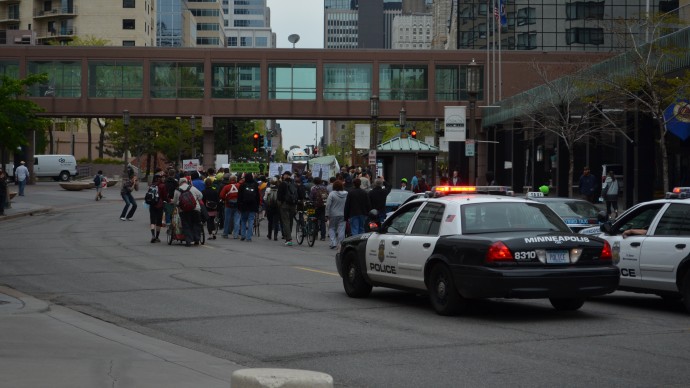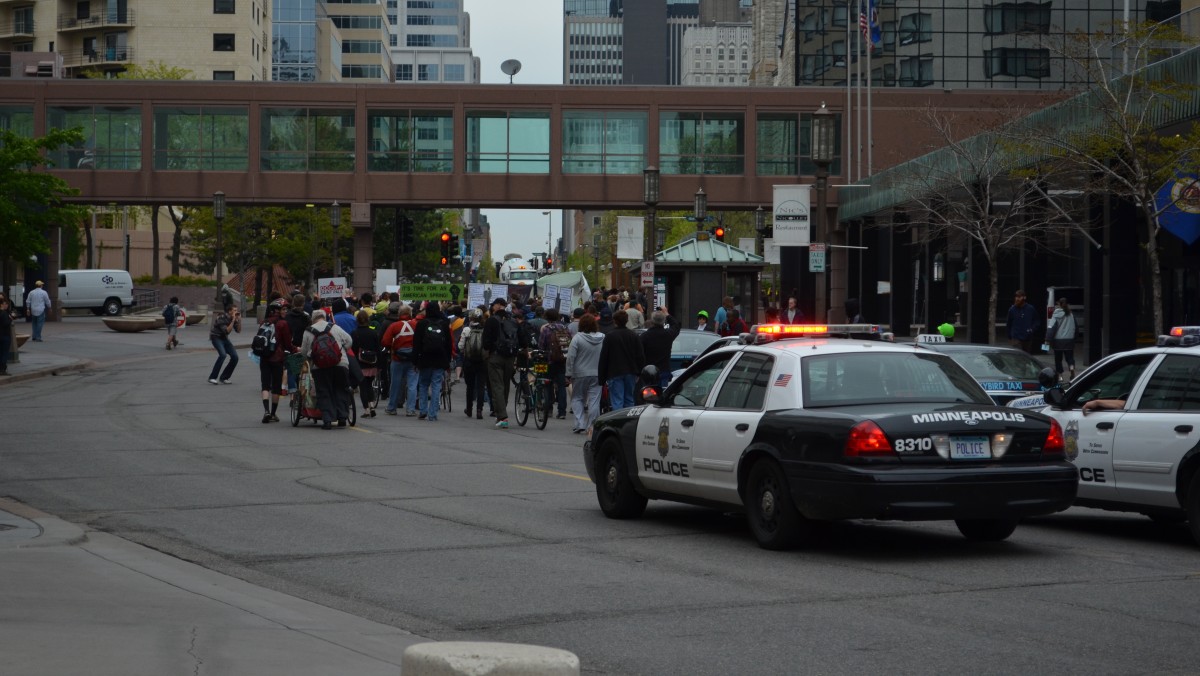
Update | By Joey LeMay
The head of the Minneapolis Police Department’s Drug Recognition Evaluator (DRE) program currently under investigation was allegedly fired from the department earlier in his career before being brought back, former and current State Patrol employees told Minnesota Public Radio (MPR). Sgt. Rick Munoz has received nine internal complaints during his eight years with the force. DRE came under fire in May when a video showed officers supplying young people, with some identifying themselves with the Occupy movement, with illegal drugs. Sources say the complaints against Munoz show allegations of constitutional rights issues to “belittling” others. The department says it will continue to look into the claims against the DRE program.
“We’re going to get to the truth,” department spokesman Bruce Gordon said at a news conference. “Right, wrong or indifferent, we’re going to know what happened. And we’re going to make sure, going forward, the program is administered legally, ethically, and in a way the community is comfortable with.”
(MintPress) – Minnesota activists, including those from the Occupy Wall Street movement, are claiming that Minneapolis police gave them illegal drugs, including marijuana, cocaine and other items, for participating in the Minnesota State Patrol’s Drug Recognition Evaluator program, which trains officers in detecting drug impairment in individuals.
In a 35-minute documentary produced by Twin Cities Indimedia, Rogue Media, Communities United Against Police Brutality and Occupy Minneapolis posted on Youtube, multiple activists describe being offered illicit drugs and fast food.
According to the video and report, police reportedly picked up suspects near Peavey Plaza and drove them to a facility in Richfield where they were tested.
An activist named Panda told filmmakers that after getting high in front of police, they asked him if he wanted to smoke even more.
“I stopped in my tracks, said ‘yes,’ and then I smoked with a cop,” he recalled, adding it was “some of the best shit I’ve had in a while.” On the way back from the testing facility, Panda said officers bought him a double cheeseburger from McDonald’s.
Later Panda explained that officers had offered him “a quarter more” of marijuana if he would become an “informant” to snitch on other Occupy protesters.
“They checked our eyes, they checked our ears, checked our lungs,” another participant recalled after police got him “high as fuck.”
“They checked our blood pressure, our pulse and all that. There were a lot [of police officers]. There were like 30 or 40.”
The claims first came to light during a controversial City Hall hearing Wednesday about banning overnight activity in Minneapolis’ public plazas.
“They gave me a full bag of weed,” Forest Olivier told the Council. “And they gave me a pipe to smoke it out of. And they just took us out to – I forgot the name of the airfield – but its somewhere in Richfield, out near the bus line. 66th and Cedar. And they let us smoke it on the sand hills where the dirt pits were.”
In a posting on the E-Democracy forum, Council Member Cam Gordon called the allegations “disturbing.”
“Last night, I was called by a concerned mother who was very upset because her son had been given free drugs by a police officer when he went out to participate in what he thought would be social action in a public plaza to help improve his community and country,” Gordon wrote. “She was shocked to learn from her son later that police gave her son illegal drugs and asked him to use them, indicating that it was okay and that it was part of a police program.”
“Her trust in the police was broken and she was baffled at how such a thing could ever be condoned by her government. She felt that it was the police’s responsibility to help keep her son safe and protect him from harm and consider that by their action the police had put him in harms way and as a violation of a public trust,” he added.
“One of the things that is most concerning about this to me is how the young and vulnerable appear to be being targeted,” Gordon said. “Beyond that, I cannot see how this program, practiced how it apparently is being practiced, can be considered ethical or in the public interest.”
Minnesota State Patrol spokesman Lt. Eric Roeske told the Minneapolis Star Tribune that officials were “looking into” the allegations. The Star Tribune updated their story, reporting that Lt. Eric Roeske said Thursday that “there’s been no evidence or no information that has been presented to us that would substantiate any of the allegations.”
He added that Sgt. Riccardo Munoz, who administers the program, told him it is against policy and procedure for police to offer anyone drugs. “To his knowledge none of that activity has taken place,” Roeske said.
The Star Tribune later added that “Roeske’s statement did not appear to rule out the possibility that officers could have acted independently.” Roeske noted that the video did not explicitly name officers that allegedly provided the drugs.
Roeske added that no official complaint has been filed into the matter.


